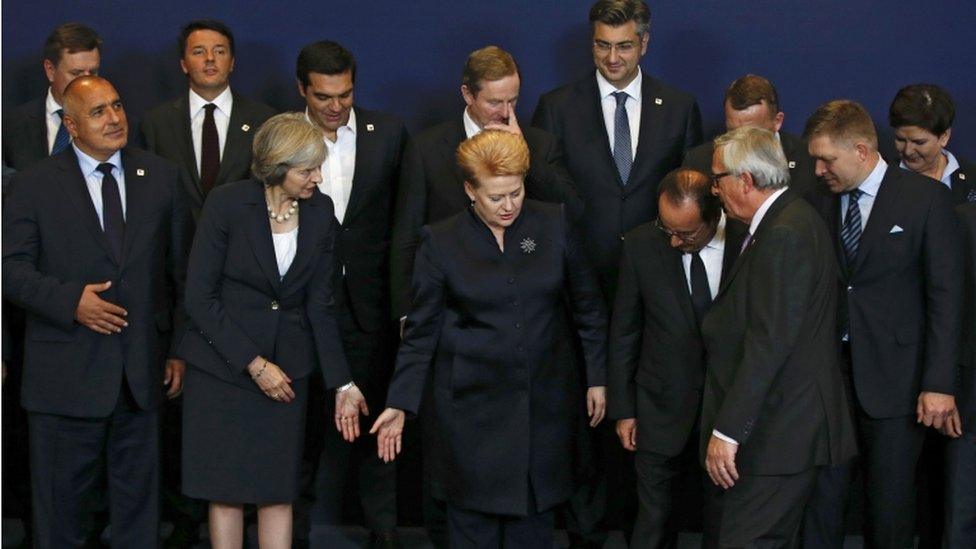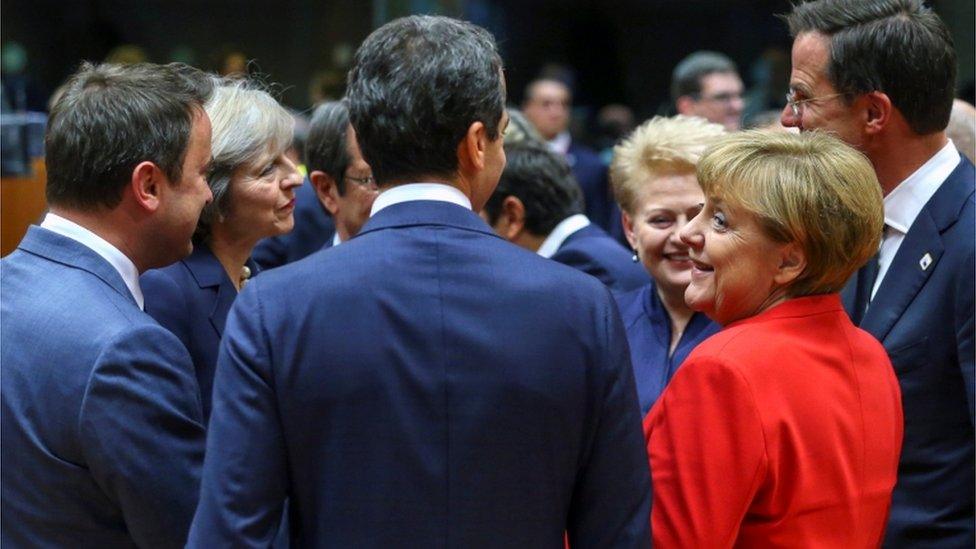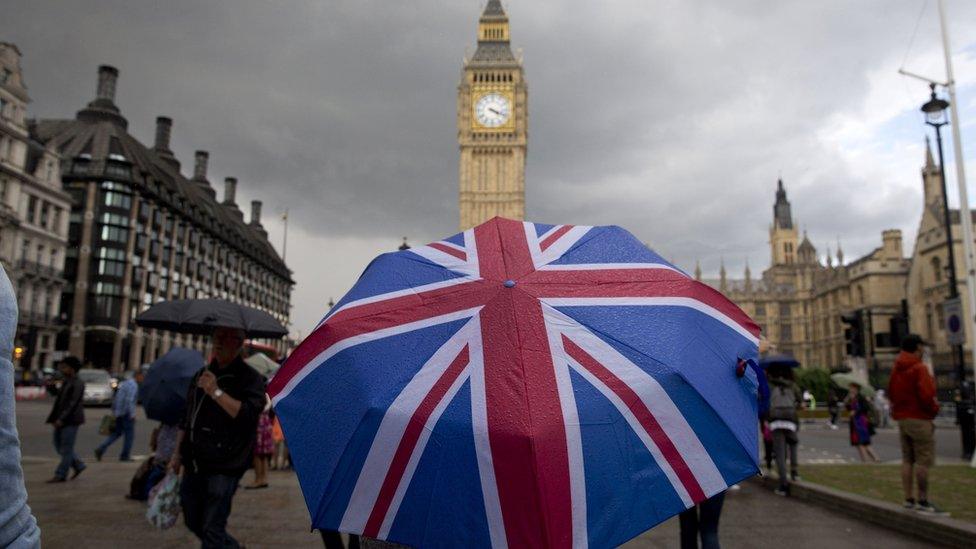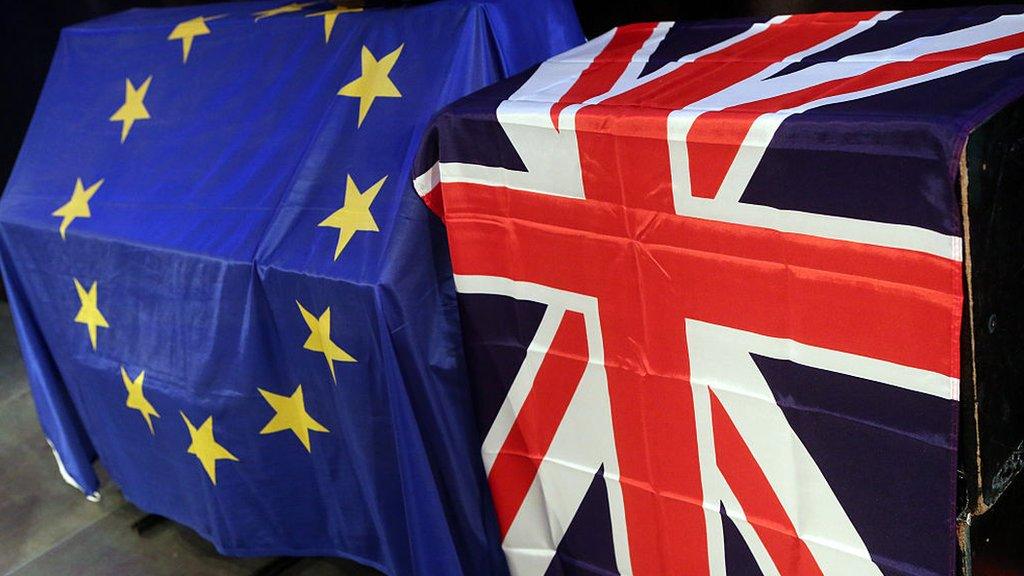Theresa May expects full EU role until Brexit
- Published
- comments
"We must continue to work together", said UK PM Theresa May
Britain expects to be part of EU decision-making until Brexit, Theresa May has told fellow EU leaders.
The prime minister said the UK should still be part of summits and negotiations when matters affecting all 28 member states were being discussed.
Sources have denied the issue was the subject of a row at a dinner at the EU summit - Mrs May's first as PM.
Both the French president and German chancellor warned if Mrs May pursued a "hard Brexit", talks would be hard too.
Arriving at the summit in Brussels on Thursday, Mrs May pledged to continue to "work closely" with the EU after Brexit.
She stressed it was important to have a "united European stance" against "Russian aggression" that included "sickening" violence in Syria.
She told fellow leaders they "must be ready to take steps to change Russia's approach and the way it thinks about this if we are ever to bring an end to the violence in Syria", according to No 10 sources.
Before sitting down for a dinner with fellow EU leaders that included pan-fried scallops, crown of lamb with roast fig and iced vanilla parfait, sources said Mrs May raised the issue of continuing UK participation in negotiations at an earlier meeting.
Sources said she was keen that the UK was still fully included in discussions that affected all members - particularly on security issues - but denied she was concerned about being "frozen out".

Analysis

EU leaders traditionally line up for a "family photo" at summits
By Kevin Connolly, Europe correspondent
Troubled by the need to find a common approach to Russian ambitions in Syria, and distracted by a faltering trade deal with Canada, the EU's leaders didn't have Brexit at the top of this summit agenda.
So long did proceedings over-run that it was reportedly 01:00 local time before Mrs May took the floor to offer a Brexit briefing.
And brief it proved to be - EU sources said she spoke for around five minutes and there were no speeches in response from the other leaders.
She used the summit though to make an important point - that just as Brexit means Brexit, so the UK remains IN the EU until the moment when it's officially out.
The British view is that that means the 27 countries that will remain shouldn't jump the gun in starting to make decisions that exclude the UK. That message has now been delivered.

But German MEP Manfred Weber told BBC Radio 4's Today programme: "It's not really normal that such a member who wants to leave a club like the EU also wants to decide the future of this club. That's really creating a lot of anger; the behaviour of the British government."
The prime minister has promised to trigger Article 50 of the Lisbon Treaty - beginning two years of formal exit negotiations with the EU - by the end of March.
This means Brexit, backed in a UK-wide referendum in June, will take place by the summer of 2019.
The Brussels summit is not focused on Brexit but on issues like migration, trade and relations with Russia.
On arrival, Mrs May said: "The UK is leaving the EU, but we will continue to play a full role until we leave and we will be a strong and dependable partner after we have left."
"It's in the interests of both the UK and the EU that we continue to work closely together, including at this summit."

European Council President Donald Tusk has insisted no formal talks between the UK and the EU can start until Article 50 is invoked.
But he offered Mrs May some words of encouragement, saying: "Some media described her first meeting in the European Council as entering the lion's den. It's not true. It's more like a nest of doves.
"You can be sure she will be absolutely safe with us."
But French President Francois Hollande said: "I say very firmly, (if) Mrs May wants a hard Brexit, the negotiations will be hard."
And German Chancellor Angela Merkel echoed that view, saying: "In practice, that will be a tough road."
'Reversible referendum?'
Joseph Muscat, prime minister of Malta - which will take over the next presidency of the EU - told the BBC he hoped to hear Mrs May's "list of priorities" for Brexit, but did not expect any "negotiations" during the summit: "We wouldn't expect to hear a specific plan with all the intricacies."
Meanwhile the President of the European Council Donald Tusk said at the dinner that he would prefer it if the UK reversed the referendum decision but added: "It's not our choice...We have to respect the decision of the referendum. If it is reversible or not, this is in the British hands. I would be the happiest one if it reversible but we now we have to start our formal works."
Lord Hill, the UK's former EU Commissioner, told BBC Radio 4's Today that there remained, among other EU members, a "surprisingly widely held view that Britain might still decide to stay in" - something he had sought to dispel.
He also warned those arguing that other EU states would not want to harm business with the UK by imposing punitive trade measures that the EU was seen as an "emotional", "political" and "quite a romantic" project.
"If we think, in the UK, that ultimately economic rationalism will win out in terms of the negotiation that is to misread how the Europeans will approach this negotiation," he said.
- Published20 October 2016
- Published20 October 2016
- Published30 December 2020

- Published12 June 2017

- Published28 March 2017
